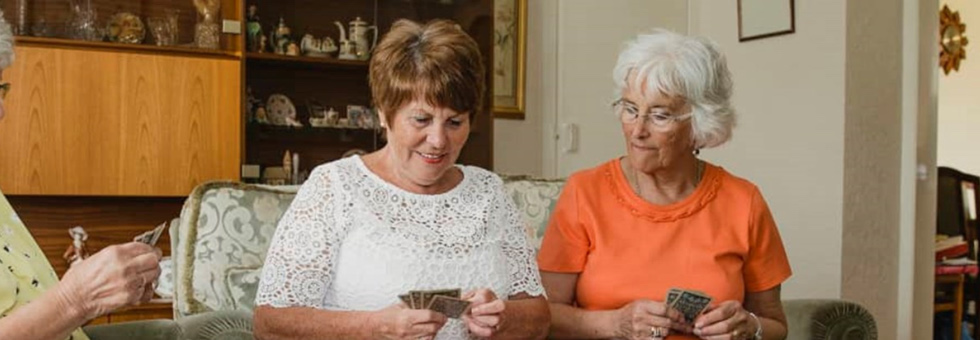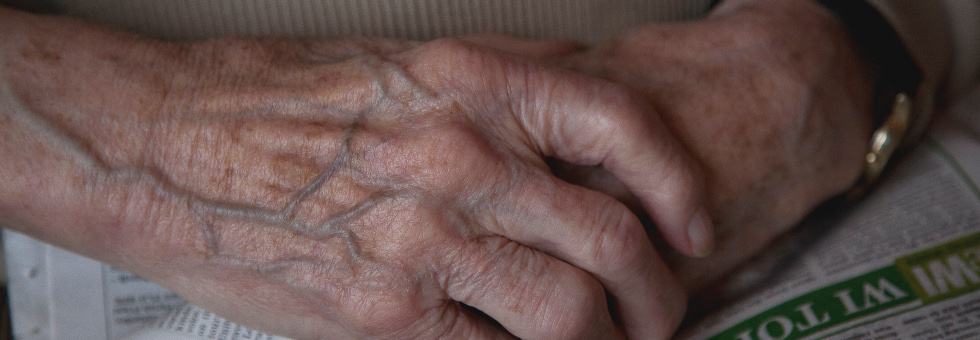Contents
This stage of the case study provides the following information.
- The Personal History sets out what is happening for Don and Madge.
- Values and Ethics – Relating to independence and dependency
- Law and policy – Relating to access to advice, information and assessment
- Knowledge, Evidence and Good Practice – Relating to: The health impacts of caring; Perceptions and experiences of home care
- Skills – Relating to relationships and end of life issues
- Activities – Relating to: Local Authority resources; Living with long-term conditions; Talking about dying; ‘Becoming a burden’
- Additional resources – Relating to: Carers; Home care; End of life
Personal History
Madge thought that she would feel less tired and breathless once the main garden work was finished. But as winter approaches, she feels more tired than ever and pauses to catch her breath when walking, especially in cold weather. She has swollen ankles which she puts down to standing too long at her housework, and the physical exertion of caring for Don. She returns to the GP in November 2014 to highlight how ill she is feeling and to ask her advice.
Madge has blood tests and her GP refers her for a chest x-ray and an echocardiogram. She is diagnosed with heart failure and given medication to improve the pumping action of her heart. The diagnosis is a shock to Madge who has always been healthy. She feels that she has not had much information, although her GP advises her to continue taking gentle exercise and to take things easier at home (avoiding heavy work). The GP knows that Madge is doing more to support Don and suggests that they consider having help at home. She suggests that Madge contacts the local Social Services to find out if they can give advice or an assessment to see if they are entitled to help.
Madge has always taken pride in her skills as a homemaker and resents the idea of a stranger in the house. She is afraid that it is a ‘slippery slope’ so that once one person comes in, more would follow, and their privacy and independence would be lost. But she recognises that it is increasingly difficult to maintain standards, continue her voluntary work and care for Don, who needs more help.
At times Madge yearns for the child she was unable to have. With a daughter or son, she would not feel so alone. She is very fond of Charlie, but does not want to burden him, as he works long hours. Charlie’s wife, Abbie, spends a lot of time looking after her own disabled elderly mother. Madge does not want to become something else for the ‘younger generation’ to worry about.
Although Don avoids difficult topics, Madge feels she has to tell him about her condition. His response is that they must get help, as he does not want Madge wearing herself out. From the experience of friends at church, they doubt they would get help from Social Services. They also feel reluctant to seek help there as their private life would become public and known to ‘the authorities’.
Madge had seen an agency in town advertising help at home. Eventually, the couple plucked up courage to contact the agency and the coordinator visited them. It was agreed that someone would come twice weekly to help with the heavy housework (vacuum cleaning, dusting, bed changing, laundry and ironing) at a cost to the couple of £50 per week. Madge thought this was extortionate but could see no other option, as she could no longer manage without help.
Initially Madge and Don felt awkward having a stranger around and found it difficult to ask her to do jobs. However, the support worker was kind and sensitive and respected that she was working in their home. They settled into the routine reasonably well but found it difficult when their usual person (Karen) could not come and a replacement was sent. The input from Karen was good for Madge who felt more in control and less tired and anxious. As their relationship with Karen developed, the couple welcomed her company. Although they had friends, Don and Madge were private people who relied on each other and found it difficult to share their worries, so it was good to have Karen to talk to.
Values and Ethics
Madge and Don are worried they will become a burden to others and are uneasy that having people in to help them will mean the loss of their independence and privacy. Their autonomy and self-reliance, concepts that are culturally valued in our society, are under threat. The Coopers are at risk of ‘dependency’, a stigmatised condition, in a society where independence is seen as the adult norm.
To work in an empowering way with Madge and Don it will be important to draw on critical understandings of the concepts of independence and dependency. There is an extensive literature on this subject which spans the work of disability, feminist and gerontological researchers and reveals the many ways in which ideas of independence and dependency are socially and culturally constructed. It provides valuable insights for social work.
Independence is associated with an ideology of self-reliance, in the United Kingdom and North America, but this may not transfer to other cultural contexts. For example, in many Asian cultures receiving support from younger family members is not a sign of weakness but something that people in old age will expect and welcome. The limitations of a self-reliance model of independence are starkly apparent in old age, when refusing help may mean isolation and the loss of choice and fulfilment through social contact and activities that provide meaning and purpose and maintain self-esteem (Secker et al., 2003). The understanding of independence developed by disability activists, that independence is not about doing things for yourself but being able to exercise choice and control, is highly relevant here (Oldman, 2002). However, the ability of older people, like younger people, to exercise agency, choice and control is critically dependent on their access to information and other resources, in particular wealth and social capital, including support networks. Helping Madge and Don to maintain choice and control will require sensitive exploration and mobilisation of the resources available to them.
Dependency as a concept is associated with the operation of power and, in particular with the assumed powerlessness of the dependent person. Sensitivity to the way in which power is operating in a given relationship and context is therefore essential to ensure choice and control for a frail older person. However it is important not to overlook the co-dependence or interdependence that often characterises the relationship between care-giver and care recipient, and the power that may be wielded over the caregiver by the person receiving care (Fine and Glendinning, 2005)
References
- Fine, M and Glendinning, C. (2005) Dependence, independence or inter-dependence? Revisiting the concepts of ‘care’ and ‘dependency’, Ageing and Society, 25(4):601-621.
- Oldman, C. (2002) Later life and the social model of disability: a comfortable partnership?, Ageing and Society, 22/6, pp 791-806.
- Secker, J., Hill, R., Villeneau, L. and Parkman, S. (2003) Promoting independence: but promoting what and how? Ageing and Society, 23(3):375-391.
Law and Policy
Access to advice, information and assessment
Madge and Don are adjusting to life with serious long-term health conditions. This is a new experience for them so information about how to manage their conditions is important. If they are to get good quality support that meets their needs, they will also need advice and signposting to help them navigate their way through the complexities of the health and social care systems. They will need to know what financial support they may be eligible for and how best to limit the costs of any services they receive. Looking to the future, they may also want to know what options might be available to them for supported living, if or when they are no longer able to remain in their own home.
The community care reforms of the early 1990s gave Social Services the role of lead agency in providing information and, where appropriate, access to help for people with potential care and support needs. However, for many older people this has not worked as intended. A wealth of evidence from research points to the difficulties older people and carers experience in accessing the advice and information they need (Tanner, 2010). This is the case even for people with life limiting conditions. For example, a study of older people with advanced heart failure identified four key barriers to approaching social services. These included difficulties in access; fears that accepting help would lead to a loss of independence, being deterred by the negative experiences of friends; and preferring to rely on care from family members (Gott et al 2007).
Under the Care Act 2014 (s.4) the local authority must take an active role in providing information and advice relating to care and support for adults and support for carers. This duty to provide information and advice extends to the whole population not just those with care and support needs as:
‘Information and advice is fundamental to enabling people, carers and families to take control of, and make well-informed choices about, their care and support and how they fund it. Not only does information and advice help to promote people’s wellbeing by increasing their ability to exercise choice and control, it is also a vital component of preventing or delaying people’s need for care and support’ (DH, 2016, 3.1).
The Care Act 2014 (s.9) requires local authorities to undertake an assessment for any adult who has an appearance of need for care and support, regardless of their financial situation and whether or not the authority thinks the individual has eligible needs (DH, 2016, 6.13).
For further information about assessment as required under The Care Act (s.9), see Section 4, Button 1.
References
- Department of Health (2016) Care and Support: Statutory Guidance Issued under the Care Act 2014 (Chapter 3: Information and Advice), available online.
- Gott, M., Barnes, S., Payne, S., Parker, C., Seamark, D., Gariballa, S. and Small, N. (2007) Patient views of social service provision for older people with advanced heart failure, Health and Social Care in the Community,15(4):333–342.
- Tanner, D. (2010) Managing the Ageing Experience, Bristol: The Policy Press
Knowledge, Evidence and Good Practice
a) The health impacts of caring
The care and support Madge has provided for Don has steadily increased as his condition has deteriorated. The physical and emotional demands of long-term care-giving have a considerable impact on the health and wellbeing of carers. A survey of nearly 3,400 carers found that 83 per cent reported that caring had a negative impact on their physical health and 87 per cent reported a negative impact on their mental health. Problems reported included anxiety or stress, depression, injury, high blood pressure and deterioration of an existing condition. Lack of time and energy meant that carers were also neglecting their own health, through lack of exercise, poor diet and missing health care appointments (Carers UK, 2012). A survey, for the report State of Caring 2015, provides a similar picture, with over three quarters of carers concerned about the impact of caring on their health in the year ahead (Carers UK, 2015).
Qualitative in-depth research into the experiences of carers reveals the kind of tensions underlying this role which may impact on health. For example carers may be heavily invested in continuing in their role but feel they must put aside their own needs, including health and wellbeing, in order to support the care receiver. Managing the caring relationship as it vacillates between closeness and connection and pushing away or distance may involve intense emotional work. As the home becomes a place of care and work, it also becomes a higher stress environment and may lose its meaning as a private, restorative space (Silverman, 2013).
Another study of the experiences of carers with long-term conditions describes how family carers may resist seeing themselves as carers, so as to avoid distress to the person they are caring for by maintaining their perception of independence. The research highlights the importance of sensitive engagement by professionals to validate and legitimise the carers’ role in order to signpost them to support (Knowles et al., 2016).
b) Perceptions and experiences of home care
Madge and Don know that they can no longer manage living at home without help. They are wary of alerting the local authority to their difficulties and in any case doubtful that they would get help from that source. They find it difficult to adjust to having strangers in their home performing tasks that they have always done for themselves. Their feelings are shared by many older people making the difficult transition from fully independent living to needing care and support in their home (Tanner, 2010).
Madge contacted a private agency she had seen locally without looking at other local providers of care and support services. Further investigation may have given her useful information about the prices for care and support in her area and perhaps additional choice in the services offered. However, it is likely that Madge and Don would have had difficulty both in accessing information and comparing the quality of the services from different private or voluntary sector providers, as noted in an inquiry into home care for older people by the Equality and Human Rights Commission (2011). Before October 2014 inspection reports from the Care Quality Commission, which regulates and inspects providers, confirmed whether an agency met its minimum standards, but gave no indication of the quality of service. Inspections since that date have provided a rating for each of five key questions, but as yet there is limited evidence to assess how effective this information is for potential service users (CQC,2015).
Findings from a systematic review of qualitative research into the experiences of older people receiving social care in the community pinpoint particular areas of difficulty (de São José 2016). Just asking for care is seen as a major challenge, as it is associated with decline, whilst dealing with unfamiliar health and social care systems reinforces feelings of powerlessness. Feelings of ambiguity are also apparent as people may prefer help from family members yet not want to be a burden, and perceive the alternative, support from paid carers, as intrusive or even threatening. Disengagement from decision making is another issue. Without constant and active efforts to ensure their participation in all decisions relating to the design and delivery of their care, older people struggle to maintain their self-determination. Receiving care in the home may also lead to a loss in confidence and in social identity, as the home is transformed from a private space into a site for formal care and surveillance.
Clear messages emerge from this research review about the properties of ‘good care’. Respect for the older person’s preferences and wishes and attentiveness to their feelings and needs is essential. Equally important is the safety and security provided by trust and continuity in the relationship with the carer. Finally there must be scope for reciprocity, so that all parties to the relationship are able to give as well as to receive. (de São José 2016)
References
- Care Quality Commission (CQC) (2015) The State of Health Care and Adult Social Care in England 2014/15.
- Carers UK (2012) In Sickness and in Health.
- Carers UK (2015) State of Caring: 2015.
- de São José, J., Barros, R., Samitca, S. and Teixeira, A. (2016), Older persons’ experiences and perspectives of receiving social care: a systematic review of the qualitative literature, Health and Social Care in the Community, 24(1): 1–11, Free access online.
- Equality and Human Rights Commission (2011) Close to home: An inquiry into older people and human rights in home care, available as a PDF download.
- Knowles, S., Combs, R., Kirk, S., Griffiths, M., Patel N. and Sanders, C. (2016) Hidden caring, hidden carers? Exploring the experience of carers for people with long-term conditions, Health and Social Care in the Community, 24 (2):203–213.
- Silverman, M. (2013) Sighs, smiles, and worried glances: How the body reveals women caregivers’ lived experiences of care to older adults, Journal of Aging Studies, 27(3):288–297.
- Tanner, D. (2010) Managing the Ageing Experience, Bristol: The Policy Press
Skills
As Madge and Don’s difficulties escalate a person-centred approach to assessment, which helps them to identify the problems they need to address and to explore possible strategies for managing them, will help the couple to maintain choice and control as they negotiate change (Richards, 2000). Working in partnership with Madge and Don will be essential to ensure that their experience and expertise about their resources and needs remain central throughout. An understanding of how to build purposeful, effective relationships underpinned by reciprocity should inform the process through from assessment to the design and delivery of care (Knowledge and Skills Statement for Social Workers in Adult Services, DH, 2015).
Both Don and Madge have life-limiting conditions so if either of them wish to talk about end of life issues, it will be vital to give them appropriate time and space to do so. In old age people often move imperceptibly into the dying phase and may therefore be denied access to the support and services available for end of life care. (Gott et al., 2011). Thoughts of death and dying are important underlying aspects of the experience of living in a chronically ill ageing body. Yet older people nearing the end of their life, who wish to talk about death and dying, may be silenced by family and health professionals (Hurd Clarke et al., 2012). With an holistic understanding of wellbeing and developed communication skills, social workers are well placed to help people engage with end of life care planning:
‘The social worker has the skills both to pick up on the cues and clues that it is time to talk about end of life care arrangements and to create the right environment for open, sensitive discussions with the person and (where appropriate) their family’ (National End of Life Care Programme, 2012, p. 14).
At this point in their lives Madge or Don may wish to consider making an advance decision and/or an advance statement. Under the Mental Capacity Act 2005 (s. 24-26), an advance decision provides a way for someone who currently has capacity to refuse a specific medical treatment, for example artificial feeding, to apply at a future time when that person no longer has capacity to take that decision. To be legally binding the advance decision must be in writing and be signed and witnessed.
An advance statement is a way of setting out wishes and preferences relating to future treatment and care. It may include, for example, religious or cultural practices and cover any aspect of care which matters to the individual concerned. It should be in writing as a resource for whoever is involved in arranging or providing care in the future. It is not legally binding.
For further information about advance decisions and advance statements see the helpful Age UK factsheet Advance decisions, advance statements and living wills.
References
- Department of Health (DH) (2015) Knowledge and Skills Statement for Social Workers in Adult Services.
- Gott, M., Ibrahim, A.M., Binstock, R.H. (2011) The disadvantaged dying: ageing, ageism, and palliative care provision for older people in the UK, in M. Gott and C. Singleton (eds.), Living with Ageing and Dying, Oxford University Press.
- Hurd Clarke, L., Korotchenko, A. and Bundon, A. (2012). ‘The calendar is just about up’: older adults with multiple chronic conditions reflect on death and dying, Ageing and Society, 32(8):1399-1417.
- National End of Life Care Programme (2012) ‘The Route to Success in End of Life Care – achieving quality for social work’.
- Richards, S. (2000) Bridging the Divide: Elders and the Assessment Process, British Journal of Social Work, 30(1):37-49.
Activities
Local authority resources
Madge and Don live in your local authority. How might they set about getting the information and advice they need at this stage?
As a starting point do you know what happens in your local primary health care settings when older people need advice and information about social care/support?
If the older person is reluctant to contact social services for advice and information, where else might they go? Where might they find out about this?
We know that Don has used Skype, but there is no evidence that the couple are using the internet to access information and advice. How easy is it to find all the information they need online for your local authority area? What would make it easier?
Living with long term conditions
Madge is providing increasing support for Don and has now been diagnosed with a serious life-limiting condition that threatens her ability to continue caring for Don at this level.
A report by Skills for Care (2013) drawing on the experiences of carers who have had an assessment found that very few carers felt they had a chance to express their mental and physical health concerns. These carers identified that it would be helpful for:
- The assessment to be delivered in a focused and unhurried way
- In an environment where carers feel comfortable to talk – this would involve clear communication about why the professional is asking about these things, reassurance that the carer is not being judged, an empathetic manner and encouraging verbal and body language signals to allow the carer to talk freely.
- Conducting the assessment in a way that feels more like a structured discussion than a form-filling exercise
- Understanding that carers may feel guilty, embarrassed or vulnerable to discuss these issues
(adapted from Skills for Care (2013) Carers Assessments: Workforce Development Opportunities based on Carers Experiences, available online.
- Bearing these observations in mind, how might you explore with Madge how her caring role is impacting on her physical and mental health?
What kind of information will you seek and how?
- Take a moment to reflect on your practice in this area. What might help you to explore and address the physical and mental health concerns of carers?
You may find it helpful for this exercise to look at the Factsheet for Carers on Carers Assessments produced by Carers UK.
Talking about dying
At this point we do not know how much longer either Don or Madge will live. We do know that both of them have concerns about the future and their deteriorating health. In this respect their situation is similar to that of many people in later life.
As individuals older people may welcome or avoid the opportunity to discuss the subject of death and dying. However, we know from research that older people who would find it helpful to talk with a professional about issues relating to their own death, or the death of someone close to them, may feel that they are blocked from doing so.
Before looking at the following questions, you may find it helpful to think about
a) an occasion when you have discussed death and dying with an older person and
b) a professional situation in which, with hindsight, you feel that the older person may have wanted to discuss death and dying but you may have missed the clues.
- How easy or difficult do you find it to identify and respond to cues and clues from an older person who wishes to talk about death and dying?
- What did you learn from the particular situations you have identified?
- Do you have any suggestions that might be helpful for colleagues who are struggling with this aspect of work with older people?
- What do you think might help you to strengthen your practice in this area?
You may find it helpful to explore your thinking here in supervision.
‘Becoming a burden’
Madge and Don are worried about ‘becoming a burden’. This is a common fear amongst older (and some younger) people.
When you reach old age, what might make you worry about being a burden to others?
In your practice what strategies do you use to try and address or mitigate any fears or anxieties older people may express about becoming or being ‘a burden’?
Additional resources
For more information about the impact of and risks associated with heart failure, see British Heart Foundation website.
For information about the importance of exercise in later life, Livewell on the NHS site has activities for the elderly.
NHS England on why investing in carers matters.
The Carers UK website has information and advice for professionals.
More information about what older people want from home care from SCIE.
The Association of Palliative Care Social Workers and others have produced a helpful resource which sets out what palliative care social work is, the role and expertise of palliative care social workers and what palliative care social work and other forms of social work can offer to support people at the end of life. Both are available as a PDF download.
For more information about advance decisions and advance statements see NHS Choices.
Additional resources added in 2019:
- Emergent models of home care.
- Better end of life care for older people.












